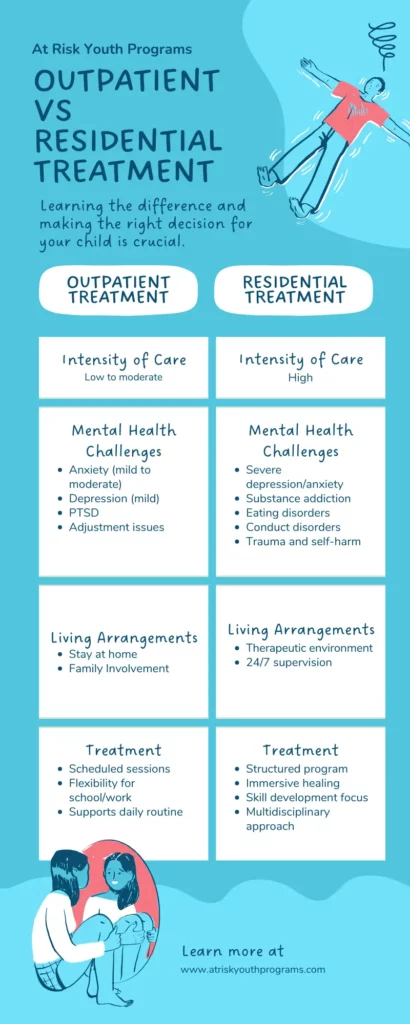5 Signs Your Teen Needs More Than Traditional Therapy: Is Residential Treatment Right?
Identifying the warning signs that a teen may need more intense treatment than counseling and outpatient therapy can be difficult for parents to recognize. It’s normal for parents to view moodiness and rebelliousness as just typical teen behavior. But when should “typical” adolescent behavior indicate the presence of serious mental health conditions that require the help of residential treatment programs?
Outpatient vs Inpatient Treatment for Troubled Teens: What Parents Should Know
The choice between outpatient treatment and residential treatment centers (RTCs) for youths comes down to living arrangements and the intensity of care. Outpatient therapy allows teens to remain at home while receiving therapy, whereas residential treatment has the teen staying at the treatment center 24/7 until they have completed the program. Other differences parents should be aware of include:
- Outpatient therapy is less intensive than residential treatment. Teenagers attend scheduled therapy sessions at an outpatient center that accommodates their school and work routines.
- Residential treatment is recommended for teens with serious mental health conditions, such as major depression, oppositional defiant disorder, or conduct disorder. Outpatient therapy is more suitable for addressing mild to moderate mental health problems that do not involve suicidal ideations or aggressive and violent behavior.
- Residential treatment offers structured, immersive environments where teens can focus solely on healing, education, and improving coping skills without being triggered by distractions they encounter in outpatient therapy.
- Some residential facilities specialize in treating specific and severe mental health conditions such as eating disorders, PTSD, or substance addiction.
5 Signs Your Teen Needs More Than Outpatient Therapy
1. Escalating Behavioral Issues
If your teen’s behavioral problems are intensifying despite the fact they are attending outpatient teen counseling, it may be a sign that the current level or type of care is inadequate or incorrect. Increasing defiance, aggression, substance abuse, involvement with the law, and suicidal ideation are warning signs that the teen requires intensive therapy in the closely monitored environment provided by residential treatment centers.
2. Poses a Risk to Themselves or Others
Teens who attempt suicide, cut themselves, or engage in violent or risky behaviors should be considered an emergency situation by parents that demands immediate action. Getting teens with these problems into a residential treatment center as soon as possible is strongly recommended to prevent them from harming themselves or others.
3. Inability to Function in Daily Life
Teens who unsuccessfully struggle with managing daily activities such as attending school and taking care of themselves while exhibiting abrupt changes to their personality and speech patterns may be showing early signs of a severe mental illness such as schizophrenia or a schizo-affective disorder.
4. Extreme Physical Health Changes
Any kind of rapid and drastic change in a teen’s physical appearance, whether that change is visible weight gain or loss, noticeably thinning hair/hair loss, or the development of sores or lesions on their skin could indicate the presence of an eating disorder, drug addiction, or both.
5. Expressing Hopelessness and Despair
Since most teens do not verbally tell their parents they are feeling depressed, parents should look for the following warning signs that indicate their child may be suffering from major depression, anxiety, and possibly suicidal thoughts:
- Avoiding friends, family, and social activities
- Spending more time alone
- Loss of interest in previously enjoyed activities
- Changes in appetite and sleep patterns
- Oversensitivity to the perceived actions and speech of others
Benefits of Residential Treatment for Teens
Intensive teen therapy provided by RTCs is administered within a structured and therapeutic environment specially designed to address a variety of adolescent mental health, emotional, and behavioral issues. If your teen shows warning signs that they need more than traditional therapy, consider the following advantages to placing them in residential treatment.
- RTCs provide 24/7 supervision and support, ensuring that teens have constant access to mental health professionals and a monitored environment conducive to healing.
- RTCs conduct thorough physical and psychological assessments to identify and address underlying issues contributing to the teen’s challenges. This type of clinical evaluation helps specialists develop the most effective and personalized treatment plan for teens with serious mental health conditions.
- RTCs offer a constructive range of therapeutic services, including individual therapy, group therapy, family therapy, and unique interventions to address all aspects of a teen’s well-being.
- RTCs have crisis counselors available 24/7 who can expertly handle a crisis effectively, providing immediate intervention and support for teens with acute mental health issues who may be vulnerable to experiencing episodes of heightened emotional distress.
- RTCs assist in developing transition plans for teens to reintegrate into their communities. This may involve creating aftercare plans, connecting with outpatient services, and ensuring ongoing support.
Deciding that residential therapy would be the best choice for a teen with ongoing and serious mental health conditions is a momentous decision for parents who have tried everything to help their child. An initial discussion with mental health specialists who will evaluate your teen’s most critical needs can help parents feel more confident about their decision.
Youth Outpatient vs Residential Treatment Programs for At-Risk Youth: A Comparison Guide (Infographic)
Keep this vital comparison at your fingertips — Save or bookmark this infographic to reference when exploring treatment options for your at-risk youth. Outpatient vs. inpatient reference. RTC or traditional therapy?













